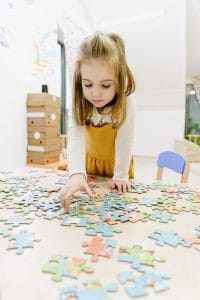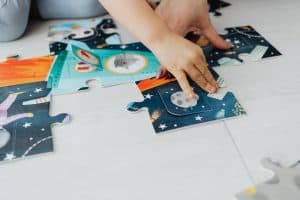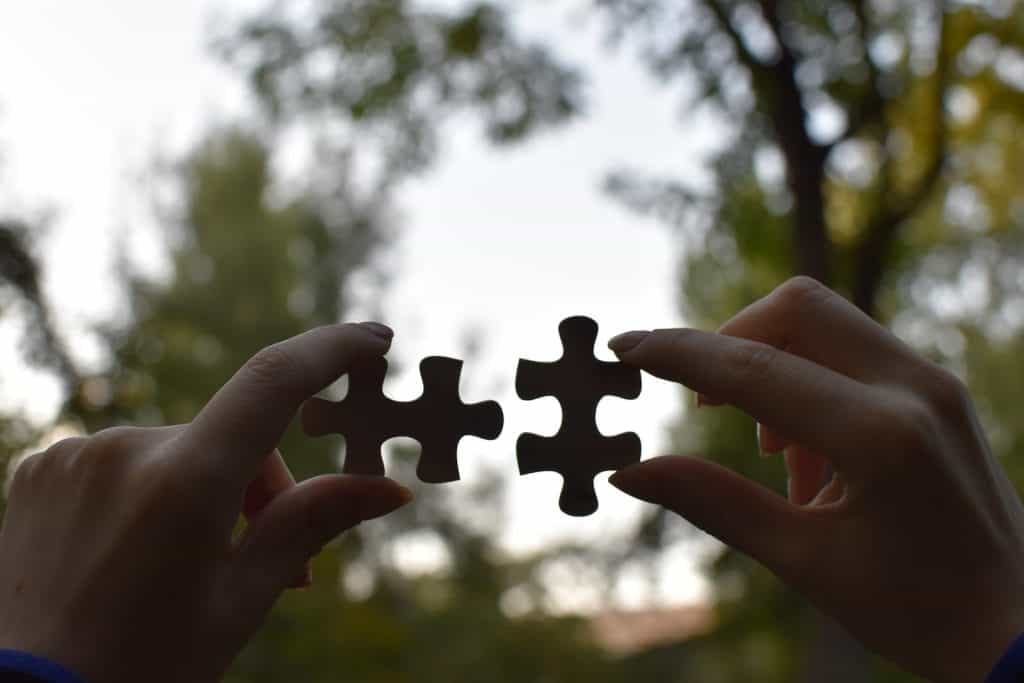Jigsaw puzzles are not only a fun and entertaining way to pass the time, but they can also be beneficial for your mind and brain. What skills do jigsaw puzzles develop? Jigsaw puzzles can help improve your problem-solving skills, memory, spatial awareness, and concentration. In this blog post, we’ll take a closer look at each of these benefits and how jigsaw puzzles can help you develop essential life skills. So whether you’re looking for a new hobby or want to give your brain a workout, grab a jigsaw puzzle and get to solve it!
What is a jigsaw puzzle?
Solving puzzles is a great way to take your mind off of the everyday and exercise your brain. A jigsaw puzzle is a set of pieces that, when put together correctly, form a completed image. The pieces are cut in such a way that they fit together only if they are placed in a precise location relative to each other. Jigsaw puzzles can vary widely in complexity and difficulty, from simpler designs suitable for young children to complex ones with thousands of pieces for more experienced puzzlers.
What Skills Do Jigsaw Puzzles Develop?

There are many skills that jigsaw puzzles can help you develop, including:
1. Jigsaw puzzles help develop problem-solving skills
Jigsaw puzzles are great for developing problem-solving skills. They teach you how to break apart a big issue into smaller, more manageable pieces and then put them back together. Additionally, you learn how to approach a problem from different angles and perspectives to build the bigger picture.
Starting with the border, you can get an idea of the general frame so that the inside becomes more clear – just like unraveling challenges in life! Putting puzzles together also teaches you how to think logically, which can help in finding solutions for real-life problems.
It’s no wonder why jigsaw puzzles have been around for centuries and are still popular today; they enhance your problem-solving abilities, allowing you to better navigate future challenges effectively.
2. Jigsaw puzzles help improve hand-eye coordination
Jigsaw puzzles are a great way to help improve hand-eye coordination and fine motor skills. While working on a puzzle, intricate movements with the hands and eyes must be coordinated skillfully to find the correct match.
Concentration is also increased through puzzling, as specific characteristics need to be identified as pieces are searched for or placed. The visual perception of shape, size, and color must all be used to find the right spot to put each piece.
Furthermore, patience is developed, as completing some challenging puzzles can take multiple hours or days. For those that struggle in school, jigsaw puzzles can provide an enjoyable activity that aids in cognitive development. Fitting the pieces together for the entire picture provides immense satisfaction and encourages perseverance when tackling difficult tasks.
3. Jigsaw puzzles help with fine motor skills
Working on jigsaw puzzles is a fun and interactive way to improve your fine motor skills. It requires good concentration to locate the correct piece and then fine motor coordination in order to place it correctly into the puzzle.
Working out where each individual piece fits helps to strengthen hand-eye coordination while developing problem-solving ability and control of the hands at the same time. Playing with puzzles encourages children to use their hands, practice their pincer grip and develop their manipulative skills.
Not only do jigsaw puzzles foster better physical control of our hands, but they also require us to work through problems logically which contributes to stronger cognitive skills as well. This makes them an ideal activity for both adults and children alike, allowing you to have fun while picking up useful skills in the process.
4. Jigsaw puzzles can improve memory and concentration

We all know jigsaw puzzles are fun, but did you know that completing them can also bring plenty of mental benefits? Jigsaw puzzles can help to improve focus and concentration, which is necessary for tasks such as studying or reading. Not only that, but the calming effect of puzzle-solving can also be beneficial for reducing stress levels.
Solving jigsaw puzzles is also great for keeping memory sharp since it activates both short-term and long-term memory in order to recall information and remember where pieces are supposed to go. As children learn, they usually solve puzzles through trial and error. However, once the child matures, they are better able to match pieces based on the overall picture of the puzzle.
5. Jigsaw puzzles can be a fun and relaxing activity for all ages
Jigsaw puzzles can be an enjoyable and calming hobby for individuals of all ages. Not only will they bring hours of entertainment, but jigsaw puzzles also have the potential to boost many skills. While solving jigsaw puzzles, problem-solving techniques are developed as people build a strategy to complete the puzzle according to their own preferences.
Puzzles also help increase a person’s spatial intelligence by helping them analyze shapes, colors and sizes in order to understand how pieces fit together. Additionally, perseverance skills are improved as puzzlers spend time locating individual pieces throughout the puzzle when problems arise. Jigsaw puzzles are not only a pastime hobby that brings joy and relaxation but a great activity that develops useful skills.
6. Jigsaw puzzles can provide social interaction
Jigsaw puzzles can be a great way to bring people together, especially during times of isolation. Whether it’s with family or friends, jigsaw puzzles are an opportunity for social interaction and connection. They help break the monotony of staying at home by providing a shared activity that everyone can participate in, regardless of age or skill level.
Plus, working together on a jigsaw puzzle increases collaboration and communication as people come up with strategies to solve the puzzle faster. This shared activity allows for hours of conversation and laughter as everyone pitches in ideas and opinions about what piece fits where. Even after the puzzle is complete, it can be framed or hung up as a proud reminder of the teamwork that went into it.
7. Jigsaw puzzles are an educational tool

Jigsaw puzzles can also be used as a fun way to learn. By combining the visual aspect of jigsaw puzzles with knowledge from different subject areas, puzzlers can gain valuable insight into various topics. For example, if someone is trying to learn about world geography, they could put together a puzzle featuring destinations around the world.
Similarly, puzzles with art or historical themes can be used to spark conversations about the facts and figures associated with those topics. This can encourage a greater understanding of the material, making it easier for children to remember and recall information later on. Likewise, jigsaw puzzles featuring animals or plants can also increase knowledge about nature.
8. Jigsaw puzzles can bring a sense of accomplishment
Finally, jigsaw puzzles provide an incredible feeling of satisfaction and accomplishment for those who complete them. After hours or days of hard work trying to match the pieces and assemble the puzzle, puzzlers are rewarded with a beautiful finished product that was created entirely by their own hands.
This victory is often enough to boost self-confidence and make people feel proud of their accomplishments. Additionally, it can also be a great way to reduce stress levels as the calming act of piecing the puzzle together helps distract from anxious or worrisome thoughts.
Final Thoughts: What skills do jigsaw puzzles develop?
Puzzle play is an excellent way to develop a variety of skills, such as problem-solving, spatial intelligence, collaboration, communication, and perseverance. Additionally, jigsaw puzzles are great for socializing with family or friends and can be used as an educational tool. Lastly, the sense of accomplishment that comes from completing a jigsaw puzzle can boost self-confidence and reduce stress. Ultimately, jigsaw puzzles are a great hobby that can provide an enjoyable and productive activity for all ages.
The benefits of puzzle play are endless, so why not give it a try? With so many different styles and difficulty levels available, you’re sure to find the perfect fit! So go ahead, grab a puzzle and start building. You won’t regret it!

